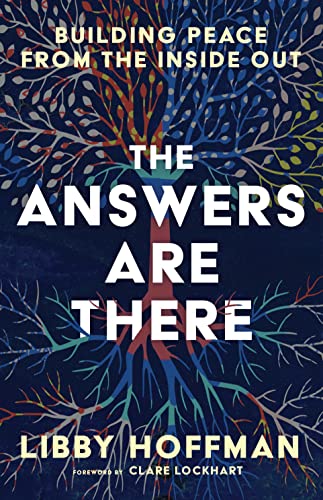The Answers Are There
Tags: non-fiction,
This book came to my attention when the Independent Book Publishers Association named it as a finalist for the 2023 Franklin Award. It describes the grassroots effort to rebuild rural communities in Sierra Leone after its bitter, decade-long civil war ended in 2002.

The war left the country wounded and deeply polarized. Neighbors had committed atrocities against neighbors. Communities broken by distrust were barely functioning, and there didn’t seem to be a path forward.
Sierra Leonean native John Caulker understood that confession and forgiveness was the only path to healing. The tribes of Sierra Leone traditionally healed through truth-telling ceremonies in which both victims and perpetrators of violence described in public, to all their neighbors, what the crimes they had committed and endured during the war.
But how could the villages even begin this process when the wounds were still so raw and resentment and distrust so bitter?
Caulker sensed the citizens wanted to be released from the cycle of pain, from being trapped in the past and broken. Beginning in villages most deeply affected by the war, he simply asked if people would be willing to begin the traditional truth and reconciliation process in which the community gathered around a bonfire to air out some very difficult truths.
The answer was yes. The communities wanted to heal their wounds and move forward.
To begin this work, Caulker approached American Libby Hoffman, founder of Catalyst for Peace. The two shared a set of common beliefs. Both had observed first-hand that traditional Western aid didn’t work. Both understood that healing comes from within; it cannot be imposed from without. The communities already had the resources and the desire to fix themselves. All they needed was the space to begin, a space not dominated by resentment, hurt and distrust.
Caulker and Hoffman made it their mission to create that space, first in the form of the truth and forgiveness ceremonies, and later in the form of groups and committees that represented all people in the communities and drew up plans on how to move forward.
Caulker described the difference between traditional Western aid and this community-led approach to rebuilding. According to the Western view, Africa has needs and the West has resources, and the practice of aid often comes down to the West imposing its resources on communities without consulting them or drawing on their internal strengths.
It’s like Sierra Leone is being recolonized by aid. The large NGOs are spearheading the response, and they have well-oiled machines–but no local structures or credibility within the community. It’s colonization by compassion. We are not victims. We are leaders and potential leaders. We are agents of change and agents of healing, agents of transformation. This needs to be built on rather than ignored.
Hoffman describes how imposing outside values derails and destroys Africa’s traditional community-based healing. After one notorious warlord had offered his testimony at a truth and reconciliation ceremony, a village began to forgive and heal.
On hearing this, another warlord wanted to lay down arms and reconcile with the factions he’d fought against during the long and bloody war. After long negotiations, he agreed to face his victims and ask forgiveness, something his victims were eager to see.
Just before he was to appear, the International Criminal Court indicted him on charges that would put him in prison for life. The warlord backed out of his agreement with the villages and remained hidden in the jungle under the protection of his soldiers.
Of this, Hoffman writes,
[T]he Acholi wanted to use their traditional ways of dealing with conflict, the cultural and communal values they rested upon, such as forgiveness, to build a path toward peace and reconciliation… [T]he international community’s assumption that justice was found in prosecution undermined the Acholi’s to advocate for and engage in a broader reconciliation process.
[The Acholi’s] local healing and reconciliation practices [were] unacknowledged and untapped by the international system. The framework of formal justice, meanwhile, had a totalizing effect, erasing the Acholi culture’s communal and restorative approaches from the global conversation and simultaneously undermining their local power and efficacy.
This erasure of local power by the West’s good intentions happens again and again, and it’s always imposed from the outside in, from the international level upon the community.
Many of the problems Hoffman describes in this book exist in the US as well: political polarization, hostility and distrust, local resentment of policies imposed by remote elites who understand neither the communities they’re impacting nor the ill effects of their well-intentioned programs.
The solutions Hoffman and Caulker foster in Sierra Leone–open discussion, compassion, and forgiveness–are the same ones we need here in the US. But pride and commitment to our grievances prevent us from getting there. The long war in Sierra Leone made life so painful, the people reached a point where they wanted to release the hurt.
The value of this book lies in Hoffman’s open-minded and open-hearted attitude toward humanity, and her description of how she and Caulker put their principals into practice. The healing they foster isn’t measurable by the standards of international organizations. It’s not a box to checked or even an outcome that can be defined as “done.”
It’s process, continually ongoing, and it requires personal investment and participation from all who wish to benefit from it. The space for healing and forgiveness doesn’t exist until you make it, and making it is an intentional and communal act. As Hoffman puts it,
Community is the place where people are connected not by position or role but simply by their fundamental humanness, and it is our very humanness that contains the seeds for transformation and healing. In fact, the reclamation of our humanity after experiencing, or even causing, great harm is the transformation.